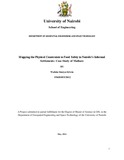| dc.description.abstract | Street vendors are the major providers of food in low-income urban settlements; unfortunately they are often seen as a problem. Their stalls increase congestion in the very limited public spaces of the settlements, often causing obstructions; and inadequate food safety measures, including poor storage facilities and contamination from nearby solid waste disposal points and open sewers, associates them to poor health. Recognising the important role of street vendors and supporting them to improve the safety and quality of their products is a major opportunity for advancing urban food safety.
This project set out to review the food safety situation in Mathare Informal Settlement, identify the physical constraints to food safety within the settlement, develop a spatial database of these physical constraints and apply the spatial database to understand the physical constraints to food safety in the settlement. The work sampled four of the thirteen villages in Mathare Informal Settlement. The project started by reflection sessions at the community level where the food vendors were able to discuss their understanding of the physical constraints and food safety within their settlement spaces. This was then followed by a mental mapping exercise to identify where and why the four villages were selected for data collection. This then led to the development of the data collection tools which included the mapping tools and the Focus Group Discussion questionnaire. The tools then had to be piloted in one of the villages in order to refine them before the actual data collection for the rest of the villages was conducted. The resultant data was then analysed and taken back to the community for verification.
The major physical constraints within the settlement have been found out to be environmental, infrastructure and space whereas the safety issues include contamination, storage, security and food handling. The study found out that there is a very strong correlation between the physical constraints and the food safety in this settlement. For instance lack of space has affected the way food vendors store their food. The study has been useful in advising both the community and the policy makers on how to improve food safety situation in Nairobi’s Informal Settlements. | en_US |

